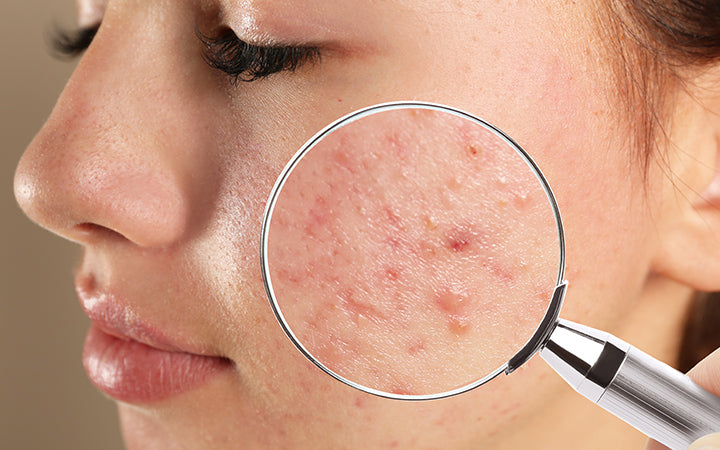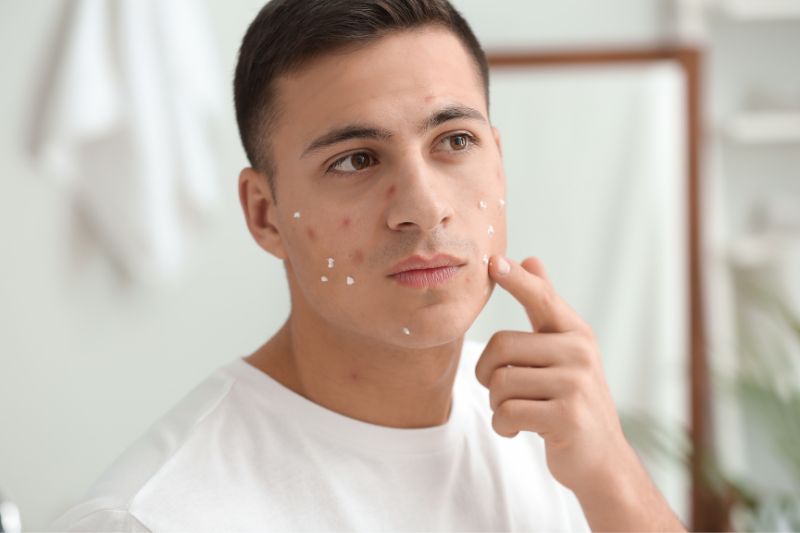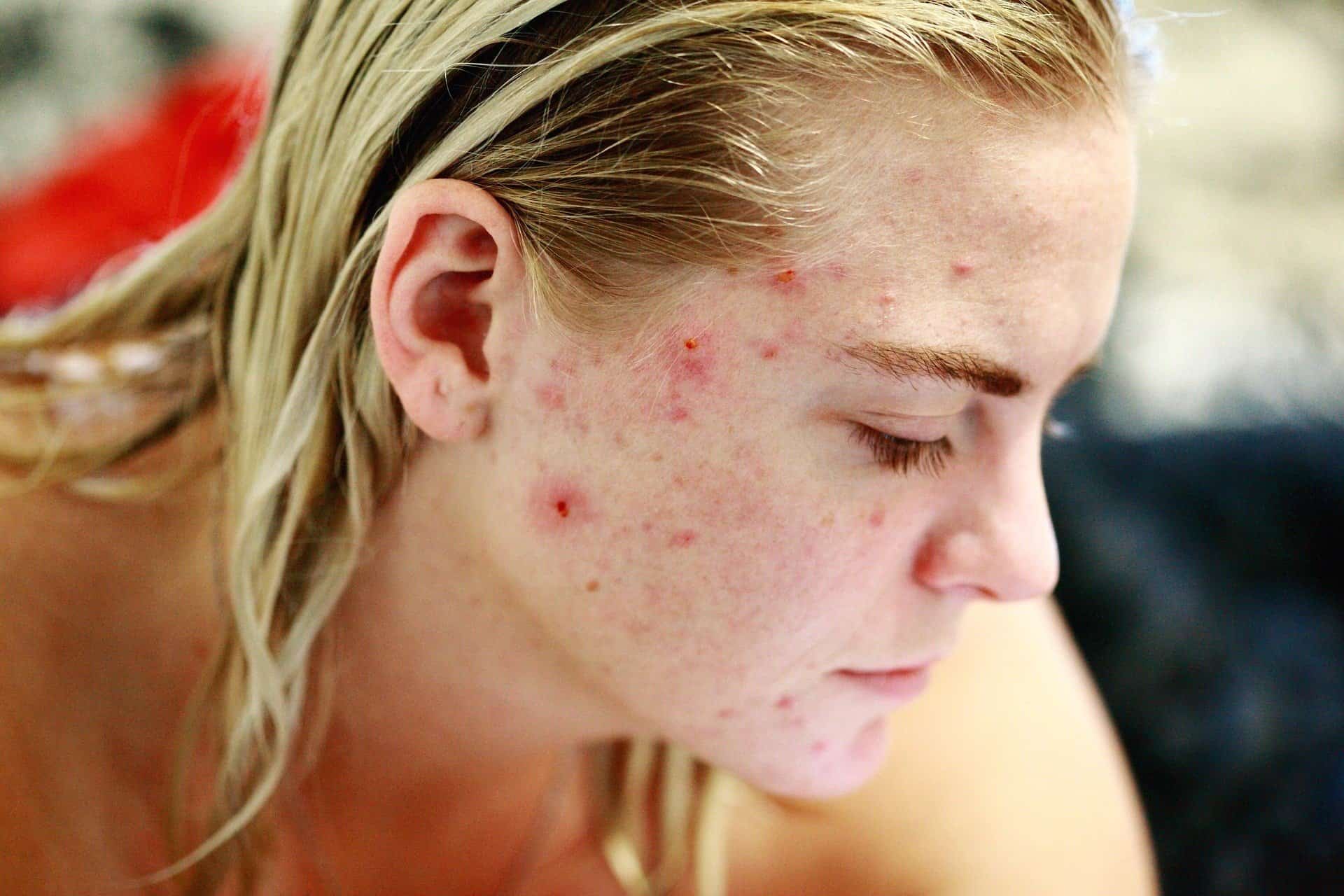Antwort What makes acne worse? Weitere Antworten – What triggers acne

Some things that may trigger acne include: Hormonal changes that make the skin oilier. These may be related to puberty, menstrual periods, pregnancy, birth control pills, or stress. Greasy or oily cosmetic and hair products.Because popping isn't the way to go, patience is the key. Your pimple will disappear on its own, and by leaving it alone you're less likely to be left with any reminders that it was there. To dry a pimple up faster, apply 5% benzoyl peroxide gel or cream once or twice a day.The four stages of acne (comedones, papules, pustules and cysts) are graded 1 through 4.

What’s the difference between acne and pimples : Pimples appear when the clogged pores become infected. The bump you see on your skin is due to an infestation of bacteria, and a single pimple is born. While a pimple is usually a singular infected bump, acne is the presence of several pus-filled breakouts spread across the skin.
What age is acne the worst
However, certain trends can be observed: Adolescence: Acne often makes its grand entrance during the teenage years, typically between the ages of 12 to 18. This is due to hormonal fluctuations that stimulate the sebaceous (oil) glands, resulting in increased oil production.
Does sleeping late cause acne : Do you go to bed too late and get up too early Or is the problem that your sleep isn't restful If you don't get good, restorative sleep, your body might not feel rested and could kick-start that cortisol surge, which could put you at risk for more acne.
One of the best properties of ice is anti-inflammatory that helps reduces and heal acne. It calms and soothes inflamed skin and minimizes the size of your pores. It also reduces the excess sebum production that is the main culprit behind acne.

An estimated 85% of teens get acne, usually starting at age 11 for girls and a couple of years later for boys. Acne can last through the teen years and into the early 20s. Some older adults may continue to be bothered by it.
Does water help acne
While other beverages can contribute to your overall hydration, water remains the best choice for maintaining skin health and aiding in acne management. Its purity and absence of additives make it an ideal choice. However, incorporating herbal teas and infused water can also be beneficial.An estimated 85% of teens get acne, usually starting at age 11 for girls and a couple of years later for boys. Acne can last through the teen years and into the early 20s. Some older adults may continue to be bothered by it.Washing your face several times a day can further irritate your skin, leading to more breakouts. What to do instead: Wash your face twice a day — when you wake up and before you go to bed.

Staying well-hydrated can also improve your immune system, supporting your body in fighting off infections — which in turn helps prevent acne. Many studies indicate that having a healthy immune system also keeps your skin's microbiome strong and able to fight off acne-causing bacteria.
Is cold water good for acne : Since cool temps cause blood vessels to constrict, a cold-water rinse can help bring down irritation-induced inflammation in acneic skin. By the same token, cold water can also help reduce puffiness, whether around the eyes or throughout the complexion in general.
How can I clear my acne fast : If you notice a breakout, here are seven ways to get rid of pimples fast.
- Dab on some benzoyl peroxide.
- Apply a little ice.
- Use products with salicylic acid.
- Apply some hydrocortisone cream.
- Use a pimple patch.
- Try a little tea tree oil.
- Visit your dermatologist.
Is heat or cold better for acne
For those with painful, cystic acne, ice can help to numb the area while reducing redness. Whiteheads can be brought to a head with a warm compress—it'll hasten the healing process too.

For most people, though, acne goes away almost completely by the time they are out of their teens. The type of acne that many teens get is called acne vulgaris ("vulgaris" means "of the common type"). It usually shows up on the face, neck, shoulders, upper back, and chest.Experts tend to agree that sun exposure may initially improve the appearance of acne by drying out sebum. Plus, when your skin is tanned, pimples and acne marks may look less noticeable. But these effects are short lived. In fact, the drying effect of sun exposure can ultimately make acne worse.
How to get rid of acne fast :
- Apply Ice to the Pimple:
- Apply a Paste of Crushed Aspirin to the Pimple.
- Use An Over-the-Counter Acne Spot Treatment.
- Use Makeup with Salicylic Acid to Conceal Pimples.
- Apply a Face Mask for Acne.
- Get a Cortisone Injection to Quickly Get Rid of a Pimple.



